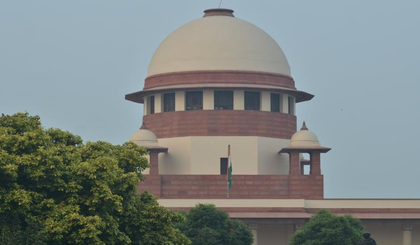SC to deliver verdict today on plea challenging Waqf (Amendment) Act, 2025
By IANS | Updated: September 15, 2025 06:45 IST2025-09-15T06:42:54+5:302025-09-15T06:45:07+5:30
New Delhi, Sep 15 A Supreme Court Bench led by Chief Justice of India B.R. Gavai is set ...

SC to deliver verdict today on plea challenging Waqf (Amendment) Act, 2025
New Delhi, Sep 15 A Supreme Court Bench led by Chief Justice of India B.R. Gavai is set to pronounce its decision on Monday regarding a stay on the Waqf (Amendment) Act, 2025, a legislation that has drawn sharp criticism from petitioners but is staunchly defended by the Union government as a measure to curb misuse of Waqf properties and enhance transparency in their administration.
The CJI-led Bench, which also includes Justice A.G. Masih, concluded hearings on May 22 after three sessions of arguments presented by both the petitioners and the Centre. The order was reserved following these hearings.
The validity of the amended Act, which received Presidential assent and came into force on April 5, 2025, has been challenged in the Supreme Court by several parties, including AIMIM MP Asaduddin Owaisi and Congress MP Mohammad Jawed.
The petitioners contend that the amendment is discriminatory and unfairly targets the Muslim community.
Senior advocate Kapil Sibal, representing the petitioners, described the amended law as, “unconstitutional” and “arbitrary”, particularly objecting to a provision that allows the suspension of a property's Waqf status during an ongoing investigation.
Joining the argument, senior advocate, Rajeev Dhavan emphasised the religious and social importance of Waqf in the Muslim community. “Waqf is not just a legal entity, but a spiritual and social institution deeply woven into the lives of Muslims,” said Dhavan, citing past Supreme Court rulings. He also argued that no external authority or officer has the jurisdiction to determine what constitutes an essential religious practice.
Earlier, Solicitor General Tushar Mehta, the second-highest law officer of the Centre, argued that the concept of Waqf is not essentially a religious practice. He said that Waqf boards administering such properties were engaged in secular and administrative functions.
The new law amended the Waqf Act, 1995, to address the regulation of Waqf properties, that is, religious endowments or properties dedicated exclusively for religious or charitable purposes under Islamic law. On April 17, a Bench headed by then CJI Sanjiv Khanna decided not to order a stay on the Waqf (Amendment) Act, 2025, after the Centre assured the apex court that the contentious provisions would not be implemented for the time being.
Disclaimer: This post has been auto-published from an agency feed without any modifications to the text and has not been reviewed by an editor
Open in app